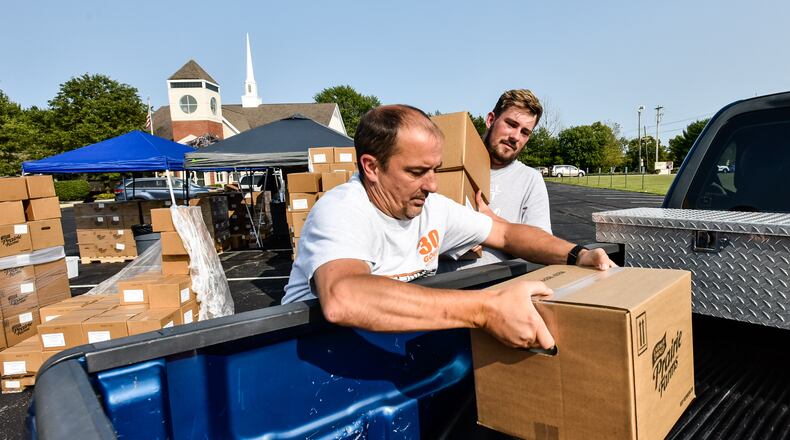“We’re going to have to find a way to procure food to meet the continued increasing demand we’ve been experiencing," he said. That means finding new funding or food sources, asking existing donors for more or dipping into the food bank’s reserves which is rarely done because the majority of the food is donated. Perdue said.
A significant portion of food Shared Harvest has distributed since the onset of the COVID-19 pandemic in Ohio was from the Coronavirus Food Assistance Program (CFAP), or the Farmers to Families Food Box Program, established by the U.S. Department of Agriculture. In the four counties serviced by Shared Harvest, nearly 35,600 prepacked, perishable food boxes — weighing more than 631,000 pounds — were distributed.
The federal food program established because of the COVID-19 coronavirus “came at a time where the need has grown substantially,” Perdue said. “It helps us to alleviate the other sources that we have.”
It also opened up the opportunity for other organizations that are not in the Shared Harvest Foodbank network access to CFAP food.
“Our pantries, our soup kitchens and shelters have been completely inundated with requests for food and having these additional outlets certainly relieved that stress that agencies are feeling," said Perdue.
The SEND Relief network also helped distribute CFAP food, and Lakota Hills Baptist Church in West Chester Twp., and several other southwest Ohio churches this past Tuesday distributed 37,000 pounds of meat products and 22 pallets of dairy products to the public and/or parishioners.
“This is what we love doing," said the Rev. Travis Smalley of helping out the community.
Smalley said his goal, as well as the other churches involved in the food distribution event, is “trying to spread the good vibe” with those struggling during the pandemic.
President Donald Trump announced during a visit to North Carolina last month an additional $1 billion will be provided to the Farmers to Families Program.
However, Perdue is doubtful the program will continue into 2021.
He also believes the federal trade mitigation food program will also end soon. The trade mitigation program is where foodbanks receive food once designated to be shipped overseas but cannot due to “trade damage from unjustified retaliation,” according to the U.S. Department of Agriculture.
“The truth and the reality is that while unemployment is improving slowly and barely, people are still struggling and they are not returning to work as they were before. And the benefits that were available are drying up now,” Perdue said.
About the Author

